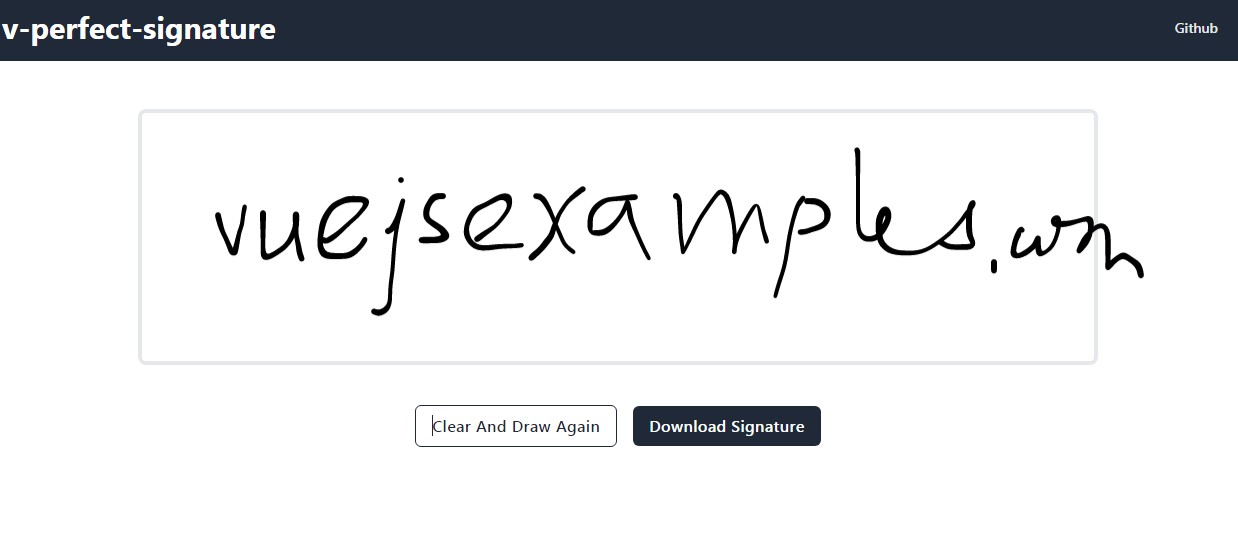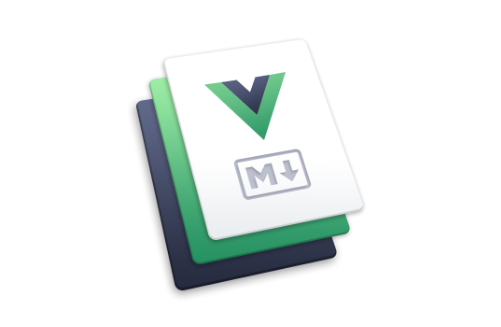Vue Signature Pad
Vue component wrap for signature pad.

Demo
Demo works in desktop and mobile browsers. You can check out its source code for some tips on how to handle window resize and high DPI screens. You can also find more about the latter in HTML5 Rocks tutorial.
Other demos
- Erase feature: https://jsfiddle.net/szimek/jq9cyzuc/
- Undo feature: https://jsfiddle.net/szimek/osenxvjc/
Installation
You can install the latest release using npm:
npm install --save signature_pad
or Yarn:
yarn add signature_pad
You can also add it directly to your page using <script> tag:
<script src="https://cdn.jsdelivr.net/npm/[email protected]/dist/signature_pad.min.js"></script>
You can select a different version at https://www.jsdelivr.com/package/npm/signature_pad.
This library is provided as UMD (Universal Module Definition) and ES6 module.
Usage
API
var canvas = document.querySelector("canvas");
var signaturePad = new SignaturePad(canvas);
// Returns signature image as data URL (see https://mdn.io/todataurl for the list of possible parameters)
signaturePad.toDataURL(); // save image as PNG
signaturePad.toDataURL("image/jpeg"); // save image as JPEG
signaturePad.toDataURL("image/svg+xml"); // save image as SVG
// Draws signature image from data URL.
// NOTE: This method does not populate internal data structure that represents drawn signature. Thus, after using #fromDataURL, #toData won't work properly.
signaturePad.fromDataURL("data:image/png;base64,iVBORw0K...");
// Returns signature image as an array of point groups
const data = signaturePad.toData();
// Draws signature image from an array of point groups
signaturePad.fromData(data);
// Clears the canvas
signaturePad.clear();
// Returns true if canvas is empty, otherwise returns false
signaturePad.isEmpty();
// Unbinds all event handlers
signaturePad.off();
// Rebinds all event handlers
signaturePad.on();
Options
- dotSize
- (float or function) Radius of a single dot.
- minWidth
- (float) Minimum width of a line. Defaults to
0.5. - maxWidth
- (float) Maximum width of a line. Defaults to
2.5. - throttle
- (integer) Draw the next point at most once per every
xmilliseconds. Set it to0to turn off throttling. Defaults to16. - minDistance
- (integer) Add the next point only if the previous one is farther than
xpixels. Defaults to5. - backgroundColor
- (string) Color used to clear the background. Can be any color format accepted by
context.fillStyle. Defaults to"rgba(0,0,0,0)"(transparent black). Use a non-transparent color e.g."rgb(255,255,255)"(opaque white) if you'd like to save signatures as JPEG images. - penColor
- (string) Color used to draw the lines. Can be any color format accepted by
context.fillStyle. Defaults to"black". - velocityFilterWeight
- (float) Weight used to modify new velocity based on the previous velocity. Defaults to
0.7. - onBegin
- (function) Callback when stroke begin.
- onEnd
- (function) Callback when stroke end.
You can set options during initialization:
var signaturePad = new SignaturePad(canvas, {
minWidth: 5,
maxWidth: 10,
penColor: "rgb(66, 133, 244)"
});
or during runtime:
var signaturePad = new SignaturePad(canvas);
signaturePad.minWidth = 5;
signaturePad.maxWidth = 10;
signaturePad.penColor = "rgb(66, 133, 244)";
Tips and tricks
Handling high DPI screens
To correctly handle canvas on low and high DPI screens one has to take devicePixelRatio into account and scale the canvas accordingly. This scaling is also necessary to properly display signatures loaded via SignaturePad#fromDataURL. Here's an example how it can be done:
function resizeCanvas() {
var ratio = Math.max(window.devicePixelRatio || 1, 1);
canvas.width = canvas.offsetWidth * ratio;
canvas.height = canvas.offsetHeight * ratio;
canvas.getContext("2d").scale(ratio, ratio);
signaturePad.clear(); // otherwise isEmpty() might return incorrect value
}
window.addEventListener("resize", resizeCanvas);
resizeCanvas();
Instead of resize event you can listen to screen orientation change, if you're using this library only on mobile devices. You can also throttle the resize event - you can find some examples on this MDN page.
When you modify width or height of a canvas, it will be automatically cleared by the browser. SignaturePad doesn't know about it by itself, so you can call signaturePad.clear() to make sure that signaturePad.isEmpty() returns correct value in this case.
This clearing of the canvas by the browser can be annoying, especially on mobile devices e.g. when screen orientation is changed. There are a few workarounds though, e.g. you can lock screen orientation, or read an image from the canvas before resizing it and write the image back after.
Handling data URI encoded images on the server side
If you are not familiar with data URI scheme, you can read more about it on Wikipedia.
There are 2 ways you can handle data URI encoded images.
You could simply store it in your database as a string and display it in HTML like this:
<img src="data:image/png;base64,iVBORw0K..." />
but this way has many disadvantages - it's not easy to get image dimensions, you can't manipulate it e.g. to create a thumbnail and it also has some performance issues on mobile devices.
Thus, more common way is to decode it and store as a file. Here's an example in Ruby:
require "base64"
data_uri = "data:image/png;base64,iVBORw0K..."
encoded_image = data_uri.split(",")[1]
decoded_image = Base64.decode64(encoded_image)
File.open("signature.png", "wb") { |f| f.write(decoded_image) }
Here's an example in PHP:
$data_uri = "data:image/png;base64,iVBORw0K...";
$encoded_image = explode(",", $data_uri)[1];
$decoded_image = base64_decode($encoded_image);
file_put_contents("signature.png", $decoded_image);
Here's an example in C# for ASP.NET:
var dataUri = "data:image/png;base64,iVBORw0K...";
var encodedImage = dataUri.Split(",")[1];
var decodedImage = Convert.FromBase64String(encodedImage);
System.IO.File.WriteAllBytes("signature.png", decodedImage);
Removing empty space around a signature
If you'd like to remove (trim) empty space around a signature, you can do it on the server side or the client side. On the server side you can use e.g. ImageMagic and its trim option: convert -trim input.jpg output.jpg. If you don't have access to the server, or just want to trim the image before submitting it to the server, you can do it on the client side as well. There are a few examples how to do it, e.g. here or here and there's also a tiny library trim-canvas that provides this functionality.
Drawing over an image
Demo: https://jsfiddle.net/szimek/d6a78gwq/




